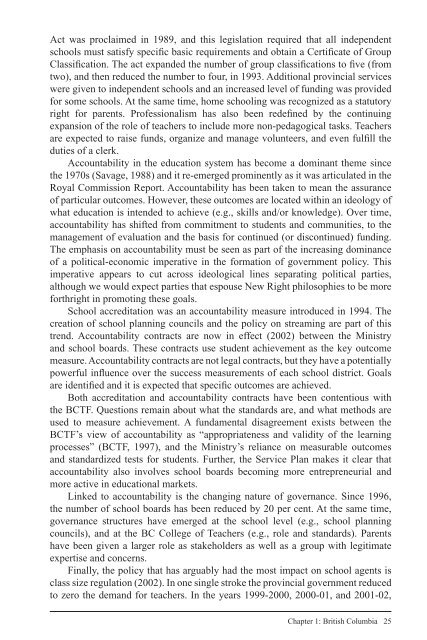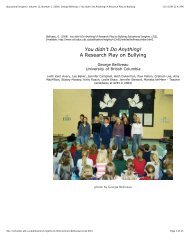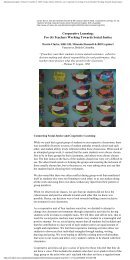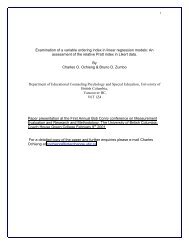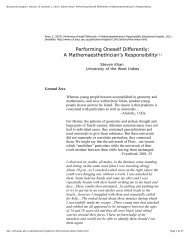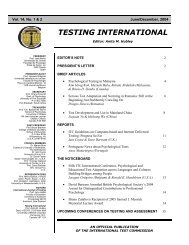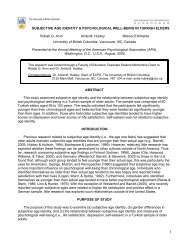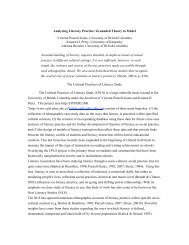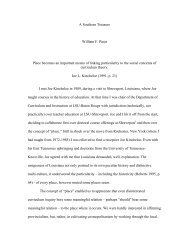The evolution of professionalism - Centre for Policy Studies in ...
The evolution of professionalism - Centre for Policy Studies in ...
The evolution of professionalism - Centre for Policy Studies in ...
You also want an ePaper? Increase the reach of your titles
YUMPU automatically turns print PDFs into web optimized ePapers that Google loves.
Act was proclaimed <strong>in</strong> 1989, and this legislation required that all <strong>in</strong>dependent<br />
schools must satisfy specifi c basic requirements and obta<strong>in</strong> a Certifi cate <strong>of</strong> Group<br />
Classifi cation. <strong>The</strong> act expanded the number <strong>of</strong> group classifi cations to fi ve (from<br />
two), and then reduced the number to four, <strong>in</strong> 1993. Additional prov<strong>in</strong>cial services<br />
were given to <strong>in</strong>dependent schools and an <strong>in</strong>creased level <strong>of</strong> fund<strong>in</strong>g was provided<br />
<strong>for</strong> some schools. At the same time, home school<strong>in</strong>g was recognized as a statutory<br />
right <strong>for</strong> parents. Pr<strong>of</strong>essionalism has also been redefi ned by the cont<strong>in</strong>u<strong>in</strong>g<br />
expansion <strong>of</strong> the role <strong>of</strong> teachers to <strong>in</strong>clude more non-pedagogical tasks. Teachers<br />
are expected to raise funds, organize and manage volunteers, and even fulfi ll the<br />
duties <strong>of</strong> a clerk.<br />
Accountability <strong>in</strong> the education system has become a dom<strong>in</strong>ant theme s<strong>in</strong>ce<br />
the 1970s (Savage, 1988) and it re-emerged prom<strong>in</strong>ently as it was articulated <strong>in</strong> the<br />
Royal Commission Report. Accountability has been taken to mean the assurance<br />
<strong>of</strong> particular outcomes. However, these outcomes are located with<strong>in</strong> an ideology <strong>of</strong><br />
what education is <strong>in</strong>tended to achieve (e.g., skills and/or knowledge). Over time,<br />
accountability has shifted from commitment to students and communities, to the<br />
management <strong>of</strong> evaluation and the basis <strong>for</strong> cont<strong>in</strong>ued (or discont<strong>in</strong>ued) fund<strong>in</strong>g.<br />
<strong>The</strong> emphasis on accountability must be seen as part <strong>of</strong> the <strong>in</strong>creas<strong>in</strong>g dom<strong>in</strong>ance<br />
<strong>of</strong> a political-economic imperative <strong>in</strong> the <strong>for</strong>mation <strong>of</strong> government policy. This<br />
imperative appears to cut across ideological l<strong>in</strong>es separat<strong>in</strong>g political parties,<br />
although we would expect parties that espouse New Right philosophies to be more<br />
<strong>for</strong>thright <strong>in</strong> promot<strong>in</strong>g these goals.<br />
School accreditation was an accountability measure <strong>in</strong>troduced <strong>in</strong> 1994. <strong>The</strong><br />
creation <strong>of</strong> school plann<strong>in</strong>g councils and the policy on stream<strong>in</strong>g are part <strong>of</strong> this<br />
trend. Accountability contracts are now <strong>in</strong> effect (2002) between the M<strong>in</strong>istry<br />
and school boards. <strong>The</strong>se contracts use student achievement as the key outcome<br />
measure. Accountability contracts are not legal contracts, but they have a potentially<br />
powerful <strong>in</strong>fl uence over the success measurements <strong>of</strong> each school district. Goals<br />
are identifi ed and it is expected that specifi c outcomes are achieved.<br />
Both accreditation and accountability contracts have been contentious with<br />
the BCTF. Questions rema<strong>in</strong> about what the standards are, and what methods are<br />
used to measure achievement. A fundamental disagreement exists between the<br />
BCTF’s view <strong>of</strong> accountability as “appropriateness and validity <strong>of</strong> the learn<strong>in</strong>g<br />
processes” (BCTF, 1997), and the M<strong>in</strong>istry’s reliance on measurable outcomes<br />
and standardized tests <strong>for</strong> students. Further, the Service Plan makes it clear that<br />
accountability also <strong>in</strong>volves school boards becom<strong>in</strong>g more entrepreneurial and<br />
more active <strong>in</strong> educational markets.<br />
L<strong>in</strong>ked to accountability is the chang<strong>in</strong>g nature <strong>of</strong> governance. S<strong>in</strong>ce 1996,<br />
the number <strong>of</strong> school boards has been reduced by 20 per cent. At the same time,<br />
governance structures have emerged at the school level (e.g., school plann<strong>in</strong>g<br />
councils), and at the BC College <strong>of</strong> Teachers (e.g., role and standards). Parents<br />
have been given a larger role as stakeholders as well as a group with legitimate<br />
expertise and concerns.<br />
F<strong>in</strong>ally, the policy that has arguably had the most impact on school agents is<br />
class size regulation (2002). In one s<strong>in</strong>gle stroke the prov<strong>in</strong>cial government reduced<br />
to zero the demand <strong>for</strong> teachers. In the years 1999-2000, 2000-01, and 2001-02,<br />
Chapter 1: British Columbia 25


